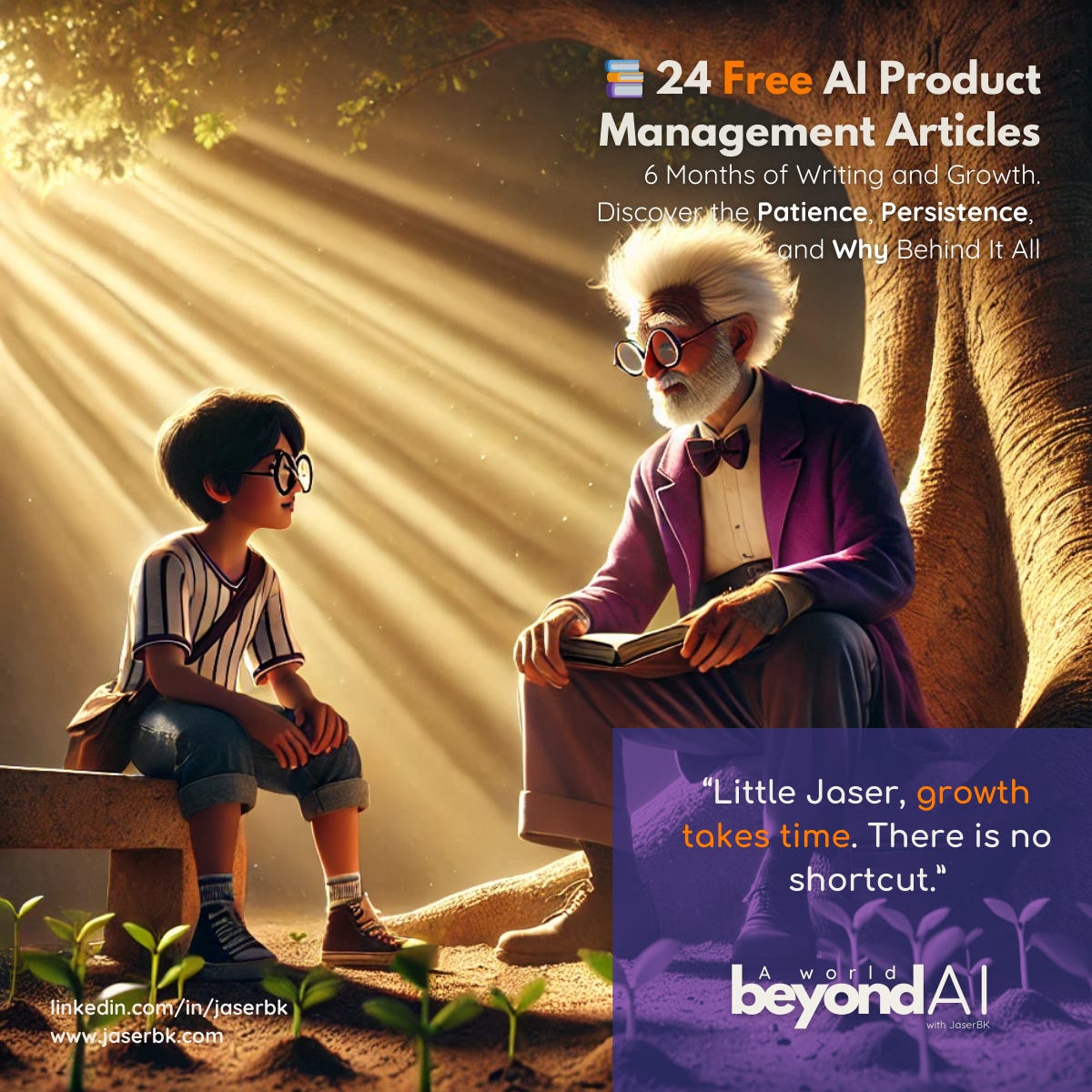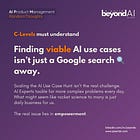📚 24 Free AI Product Management Articles
6 Months of Writing and Growth—Discover the Patience, Persistence, and 'Why' Behind It All
#beyondAI - This week I’ve shared one article per day with some of you on LinkedIn— each one a deep dive into AI Product Management. Over the past six months, I’ve written weekly long-form articles, a journey that began as a personal challenge and turned into a habit. At the start, it was exhausting—juggling my 9-5 with this—but I knew from experience that persistence pays off, and it did. Like building any skill, the process eventually became less draining and more rewarding.
But this is only half of the story.
The why behind my writing is what has kept me going. I don’t write for financial gain—though that could come one day—my real motivation needed to be deeper. I've learned from other authors there's no overnight success in writing, especially when it's for a living. For me, it is that I’ve realized that writing gives me the space to reflect, and, more importantly, the opportunity to teach others. The first part strengthens my skills as an AI Product Manager; the second part, honestly, nourishes my soul.
In March 2024, I took the leap into writing on Substack, a step forward after overcoming fears of public writing with short-form posts on LinkedIn. Although I had dabbled in writing before, this time felt different. I’ve grown, and I can’t help but feel that my writing has improved too. Learning to write long-form content is a lot like managing AI products—something I’ve been doing for over a decade. It takes time. It takes persistence. And no amount of technology can bypass the process. As the metaphor goes,
You can't produce a baby in one month by getting nine women pregnant
Warren Buffett
(who else would describe the act of giving birth as a production process? 😄)
Some things, like mastering new skills or developing a great AI product, simply can’t be rushed.
For example, in AI product development, adding more engineers during data discovery or validation won’t necessarily speed things up because those phases require deep focus and iteration. But when you’ve reached the testing or optimization phases, extra hands might make the difference. You need the right foundation first, and only then can you scale.
This same principle applies to aspiring AI Product Managers. You can’t just throw more resources at learning the craft and expect to grow faster. You need to spend time absorbing the basics, reflecting, and putting your knowledge into practice. It’s only after you’ve laid that groundwork that additional learning or resources can accelerate your progress.
Now, after six months of public writing, I’ve learned the same lesson here as in AI product management. Again. Mastering any new skill, and unlearning bad habits, takes time. It requires the right focus, patience, and, most importantly, application. And always make sure your why is clear to you. Choose a why that isn’t dependent on the goodwill of others. Your why should come from within. This way, it will anchor you to your purpose, keep you motivated through challenges, and allow you to persist even when external validation is absent.
In today’s world, it’s easy to consume endless free resources. You might find yourself scrolling through your favorite social media platform, passively consuming great content without any intention of learning. The problem is, that this type of consumption doesn’t lead to real growth. Real growth requires more than just absorbing content. Deliberate learning is the key phrase here.
So, when you read my articles, I ask that you do so with the intention of applying the lessons. It’s only through digestion and real-world use that this knowledge becomes valuable.
Be the product manager of your own growth. Make sure what you invest in creates value when it comes out. Otherwise, you’re just wasting time. And that’s one thing we can’t afford to waste.
With this prelude, as I close my one-week series of article sharing, I’d like to present what I’ve achieved so far: 24 long-form articles on AI Product Management. These are not just words on a page. They represent at least 24 weeks of writing, reflecting, learning, and sharing.
My hope is that you’ll not only read them but also internalize and apply the lessons.
That’s how I’ve grown. That’s how you can too.
Happy reading 🛋️
P.S. If you’ve found my posts valuable, consider supporting my work. While I’m not accepting payments right now, you can help by sharing, liking, and commenting here or on my LinkedIn posts. This helps me reach more people on this journey, and your feedback is invaluable for improving the content. Thank you for being part of this community ❤️.
1. Foundations of AI Product Management
The Path to AI Product: A foundational overview of what it takes to transition an AI Use Case into an AI Product. Offering insights to key terminologies and how you can master the entire lifecycle.
Why AI Product Managers Are Best Equipped for an AI-Dominated Future: Exploring why AI Product Managers are uniquely suited to lead in a world increasingly dominated by artificial intelligence.
AI is Not a Priority... Until It Becomes a Priority: A reflection on how AI projects often shift from being a low priority to mission-critical, and how to handle this shift.
My Typical Week as an AI Product Manager: A candid look at the daily responsibilities and challenges of being an AI Product Manager.
You Are Not an AI Product Manager If...: Defining the core traits of a true AI Product Manager and challenging common misconceptions about the role.
2. Prioritization and Assessment
How to Prioritize as an AI Product Manager: A detailed guide on assessing ideas for development, focusing on impact, feasibility, and resource management.
How to Assess Financial Viability as an AI Product Manager: Strategies to evaluate the financial health of your AI product and ensure it's set up for long-term success.
Scaling the AI Use Case Hunt: Insights into identifying and scaling AI use cases within an organization, navigating from ideation to real-world impact.
AI Initiatives are Investments. Act Like It.: AI projects should be treated as long-term investments, requiring careful planning and commitment, rather than short-term experiments.
3. AI Project Execution
Why AI Projects Fail and How to Fix Them: A breakdown of common reasons AI projects fail, with practical tips for avoiding these pitfalls and improving success rates.
Why AI Initiatives Aren't Just Projects: A thought-provoking take on why AI initiatives are more than just projects, requiring long-term vision and adaptability.
4. AI and Data Science Collaboration
The Declining Era of Data Science Teams as Mere Service Providers: An exploration of the evolving role of data science teams, transitioning from service providers to strategic partners in AI development.
AI Products Are Incomplete Without Data Products: Emphasizing the critical role of data products in driving the success of AI initiatives.
The Depressed Data Science Unicorn: A look into the challenges faced by data scientists in AI development and how to better integrate their skills into AI products.
5. Technical Deep Dives
I'm Back in the Natural Language Processing Game: My personal dive back into NLP, covering trends, tools, and strategies in the evolving space of language models.
Learn Why You Should Deep Dive into LLMs as an AIPM: A detailed look at why large language models (LLMs) are essential for AI Product Managers to understand and leverage.
6. Frameworks and Strategies
The Double Trio Framework for AI Product Management: Introducing a unique framework to help AI Product Managers navigate the complexities of AI projects and decision-making.
The AI Use Case Pandemic: A critical take on the overwhelming proliferation of AI use cases and how to navigate through the noise to focus on what truly matters.
When to Automate and When to Augment with AI?: A guide to understanding when automation is the right choice and when human augmentation provides better outcomes.
Are You Learning the Right Skills for AI Product Management?: A guide to identifying the most important skills to develop as an AI Product Manager.
How AI Products Can Have Double Impact: This article explores how AI products can simultaneously improve the bottom line through cost savings and drive top-line growth through new revenue opportunities.
7. Bias and Ethics
Do You Really Know What Bias Is? (Part 1/2): An introduction to understanding bias in AI, exploring how it manifests and impacts product development.
Do You Really Know What Bias Is? (Part 2/3): A continuation of the discussion on bias, with practical tips on mitigating its effects in AI models.
8. Don’t-know-where-to-put category
Why We Need a Curated Learning Repository for AI Product Managers: Discussing the importance of curated knowledge sources to help AI Product Managers stay on top of the fast-evolving field.
Final Thoughts
And here we are, at the close of this one-week series, yet another chapter in both my writing and professional growth. Just as every phase in AI product development requires the right investment of time and resources, so does honing your own skills. Writing these articles has been my way of refining not just my understanding of AI Product Management, but also my ability to teach and inspire others.
I hope these articles offer you insights, but more importantly, I hope they motivate you to take what you’ve learned and apply it. Growth is not about consuming more—it’s about reflecting and doing. You can’t rush mastery, and you can’t shortcut the lessons that come from deliberate practice.
So, whether you’re just starting out or deep into your AI Product Management career, I encourage you to read, reflect, and put your learnings into action. Just as nine mothers can’t bring a baby into the world in a month, you can’t fast-track growth progress.
Here’s to the journey ahead.
Keep learning.
Keep growing.
And most of all, know your why.
JBK 🕊
P.S. If you’ve found my posts valuable, consider supporting my work. While I’m not accepting payments right now, you can help by sharing, liking, and commenting here or on my LinkedIn posts. This helps me reach more people on this journey, and your feedback is invaluable for improving the content. Thank you for being part of this community ❤️.



























